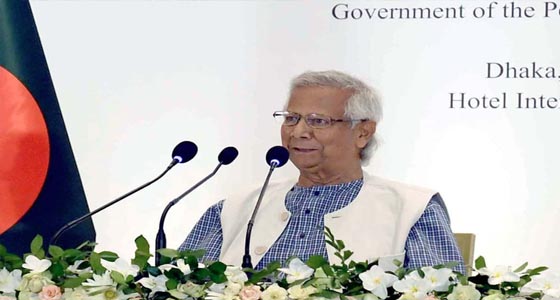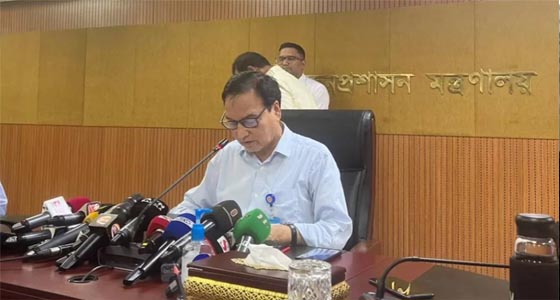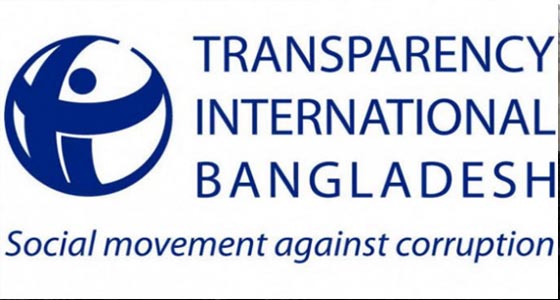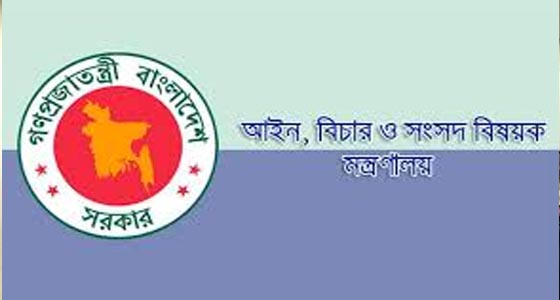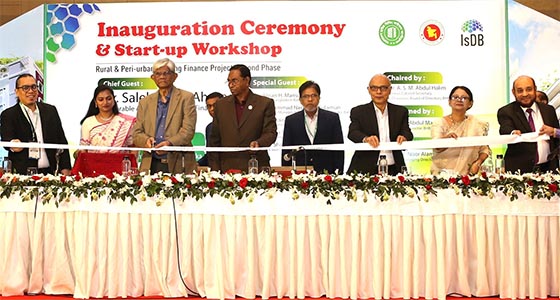Fair, participatory polls to be arranged after necessary reforms: CA
- Last Update : 02:40:34 pm, Sunday, 18 August 2024
- / 666 Read Count
Staff Correspondent
Chief Adviser to the interim government Prof Dr Muhammad Yunus today said a free, fair and participatory election will be arranged in the country as soon as possible after bringing necessary reforms in state system.
“The main task of the present government is to arrange a fair election as soon as possible. But, before that, a conducive environment must be created by brining major reforms in judiciary, civil administration, law enforcement agencies and mass media,” he told a meeting with diplomats at Hotel Intercontinental here.
The chief adviser briefed diplomats of different countries and resident representatives of the United Nations’ agencies in Dhaka.
Later, press secretary to chief adviser, Shafiqul Alam briefed reporters about the outcome of the meeting.
After the fall of the Sheikh Hasina government in the face of student-people movement on August 5, the interim government, led by Prof Dr Muhammad Yunus, was sworn in on August 8. After assuming office, Dr Yunus briefed foreign diplomats today for the first time.
Shafiqul Alam said the chief adviser informed the diplomats that the main task of the interim government is now to bring the law and order situation to normalcy.
Speaking at the meeting, Prof Yunus said the situation started to get normal, while he welcomed the probe team of the United Nations to conduct a fair investigation into the incidents of killing took place during the quota reform movement.
Terming the August 5 mass uprising the ‘Second Independence’, he said Bangladesh has started a new journey. He sought full cooperation of all in reconstructing the country.
Addressing the ‘Meet & Greet Session’, Prof Yunus said he took over a country which was in many ways a completely mess.
“In their efforts to stay in power, the Sheikh Hasina dictatorship destroyed every institution of the country. Judiciary was broken. Democratic rights were suppressed through a brutal decade-and a half long crackdown,” he said.
Elections were rigged blatantly, while generations of young people grew up without exercising their voting rights, the chief adviser said.
“Banks were robbed with full political patronisation. And the state coffer was plundered by abusing power,” he added.
He said a new era has begun “as the students impressed upon us their dream of a country where people, regardless of their political, religious or ethnic identity, will be able to fulfill their aspirations and enjoy full freedom of expression, with the government upholding democracy, justice and human rights and freedom of speech”.
Prof Yunus said top priority of the interim government would be to bring the law and order situation under control.
“We will be close to normalcy within a short period of time, with the unwavering support of our people and patriotic armed forces. The police force has also resumed their operations,” he said.
He said the armed forces will continue to serve in aid of civil power as long as the situation warrants. “Our government remains pledge-bound to ensure safety and security of all religious and ethnic groups.”
The chief adviser said the government has also made it a priority to ensure justice and accountability for all the killings and violence committed during the recent mass uprising.
“I have spoken to the UN human rights chief Volker Turk. I welcomed the UN rights office’s move to send a UN-led fact finding mission. We want an impartial and internationally credible investigation into the massacre and subsequent due judicial processes.
“We will provide whatever support the UN investigators need. The revolutionary students want us to carry meaningful and deep reforms, which will turn the country into a real and thriving democracy. The task is huge, but doable with the support of all people and international community,” he said.
“I must succeed. We don’t have any other option,” he said, adding that the government would also make sincere efforts to promote national reconciliation.
Prof Yunus said the government will undertake robust and far-reaching economic reforms to restore macroeconomic stability and sustained growth, with priority attached to good governance and combating corruption and mismanagement.
“It will uphold and promote all our international legal obligations, including international humanitarian law and international human rights law,” he said.
“Our government will adhere to all international, regional and bilateral instruments it is a party to. Bangladesh shall continue to remain an active proponent of multilateralism, with UN at the core. We look forward to maintaining and enhancing Bangladesh’s contributions to the UN peacekeeping operations.
“Our government will continue to support the million plus Rohingya people sheltered in Bangladesh. We need sustained efforts of the international community for Rohingya humanitarian operations and their eventual repatriation to their homeland, Myanmar, with safety, dignity and full rights,” the chief adviser said.
Encouraged by the words of support by our international friends and partners, he said, the government will nurture friendly relations with all countries in the spirit of mutual respect and understanding and shared interests.
“We call upon our trade and investment partners to maintain their trust in Bangladesh for economic prosperity. For our part, we won’t tolerate any attempt to disrupt the global clothing supply chain in which we are a key player,” he said.
Noting that Bangladesh stands at the crossroads of a new beginning, Prof Yunus said the valiant students of the country and its people deserve a lasting transformation of the nation.
“It is a difficult journey and we need your help along the way. We need to fulfill their aspirations. The sooner the better. We have to create opportunities to build a poverty-free and prosperous new Bangladesh,” he said.
He said they do believe that all their friends and partners in the international community will stand by the interim government and people as they chart a new democratic future.
The chief adviser said it is two weeks that Bangladesh witnessed a Second Revolution, while hundreds of thousands of the valiant students and people rose up against the brutal dictatorship of Sheikh Hasina.
“She fled the country — but only after the security forces and her party’s student wing committed the country’s worst civilian massacre since the country’s independence. Hundreds were killed and thousands were injured,” he said.
Prof Yunus said many hundreds of students have already lost or could lose their eyesight after rubber bullets were shot at their eyes.
Paying his deep respect and homage to all those valiant students and innocent people who made the supreme sacrifice, he said students of no other countries in recent memory had to pay so much a price for expressing their democratic aspirations, dreaming a discrimination-free, equitable and environmental-friendly nation where human rights of every citizen are fully protected.

